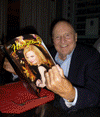Ever since he burst on the scene with his 1973 smash album Piano Man, Billy Joel has captivated the world with his musical virtuosity. He’s racked up 100 million album sales—only solo artists Elvis Presley and Garth Brooks have topped his record. Sixteen of Joel’s albums have gone platinum, he’s nabbed numerous Grammys, and has more than earned his permanent status in the Rock and Roll Hall of Fame. But the Piano Man keeps movin’ on, exploring new musical genres. His 2001 album Fantasies and Delusions: Solo Pieces for Piano stormed classical music charts, and this fall Joel took on Broadway in collaboration with famed choreographer Twyla Tharp: Movin’ Out fuses a roster of Joel’s classics—like “Big Shot,” “Movin’ Out,” and “Scenes From an Italian Restaurant”—with Tharp’s stylized modern ballet, causing critics to dub it a “dance musical,” “rock ballet,” even simply a “dance.” But to the 53-year-old composer—who dislikes being stereotyped as a “pop singer”—Movin’ Out defies all labels.
Born in the Bronx and raised in a Long Island working-class neighborhood, Joel is relentlessly critical of his own work—he wasn’t impressed with his Grammy-winning “Just The Way You Are” when he first recorded it—and unflinchingly candid about his personal life. He’s taken the tabloid heat of the celebrity spotlight since his marriage (it was his second) to supermodel Christie Brinkley in 1985, which dissolved after three years but resulted in the birth of their now 16-year-old daughter, Alexa. Despite a six-year relationship with Hamptons artist Carolyn Beegan in the ‘90s, and a recent stint with TV news anchor Trish Bergin, Joel is the first to admit a long-term relationship has eluded him. Most recently he’s fought a bout with alcoholism—and he checked himself in for ten days of rehab.
In his true no-holds-barred style, Joel talked to The Sheet about the creative process, the impact of 9/11, a recent New York Times Magazine profile—which labeled him as morose, unmotivated, and uncool—and the qualities that make for true love. You’ll find in his words the honesty, integrity, and soul-searching that make for the coolest superstar ever—a man who looks truth in the eye and keeps movin’ on...
Hampton Sheet:
A few theater critics have described Movin’ Out as pure ballet rather than a musical. How do you describe it? Is it a combination of rock, ballet, and musical theater?
Billy Joel:
Well, I hope somebody does come up with a name for what this is, but I wouldn’t know what to call it. When I try to explain to people what it is, it’s all the things you mention.
HS:
What was your initial reaction when Twyla Tharp pitched the idea to you?
BJ:
I was intrigued by her idea—which was to choreograph the songs rather than create a book musical. I thought it was a better idea than other suggestions people had made, because I’d been sent scripts, synopses, books—about using the songs—which I thought were forced and trite. And the idea of dance, which is abstract, and fleshing out characters appealed to me. It was different, risky, untried—that’s what was appealing.
"What’s important to me for my own artistic fulfillment is just to create, whether people know about it or not—that’s not the point, as long as I know about it."
HS:
Did musical theater influence you as a kid?
BJ:
All kinds of music influenced me. I grew up listening to rock and roll, jazz, classical music, Latin music, operetta, Broadway—you name it, I grew up listening to everything.
HS:
Did you ever consider writing an original musical?
BJ:
Yes, I have. I’d like to be the one to come up with the book idea, because I have difficulty writing music based on other people’s ideas. I like to write songs based on my own ideas.
HS:
How did you feel about someone else singing your songs?
BJ:
I liked it. It was a somewhat out-of-body experience. But they’re my songs, I did create them, and it was nice to hear them performed by Michael Cavanaugh—someone other than me. It’s a different sound. I’m seeing my creations living without my having to breathe life into them.
HS:
Was there much input from you?
BJ:
I had some input in terms of music and the arrangements, but it was pretty much Twyla’s vision. I’m very happy with it.
HS:
Opening night I noticed how fit you looked. How did you lose the weight and get into such good shape?
BJ:
Thank you! I’m just watching my weight. I’m watching food intake and taking care of myself. No super-secret diet. A certain amount of aggravation is helpful.
HS:
Is there any other musical genre you’d like to explore? You mentioned years ago that you lost interest writing pop songs and would concentrate instead on classical scores.
BJ:
I don’t know that I’ll never write any pop songs again. But I sort of lost interest in doing that. I did compose an album of piano pieces that was released last year, which did quite well. I’m writing all the time, whether I’m completing music, recording music, or performing it.
|
Twyla Tharp
|
Billy Joel, Kathleen Turner
|
Rosie O'Donnell
|
|




